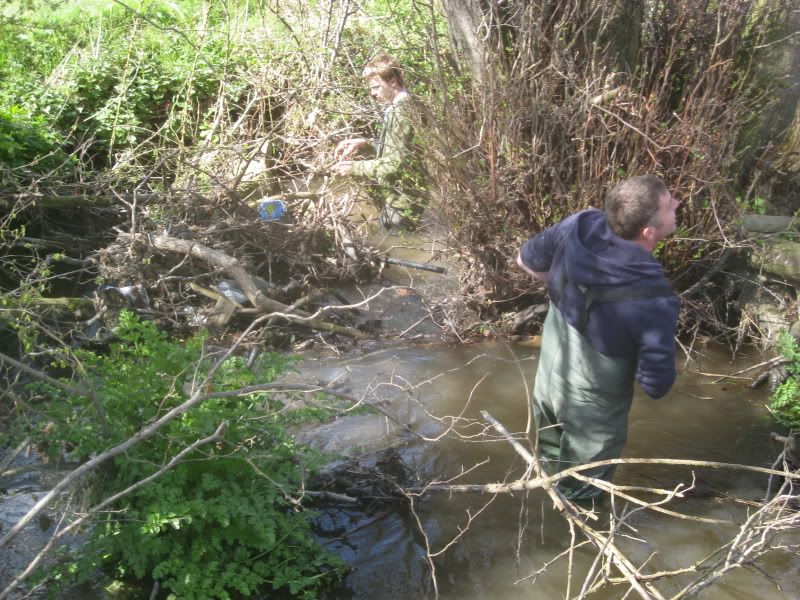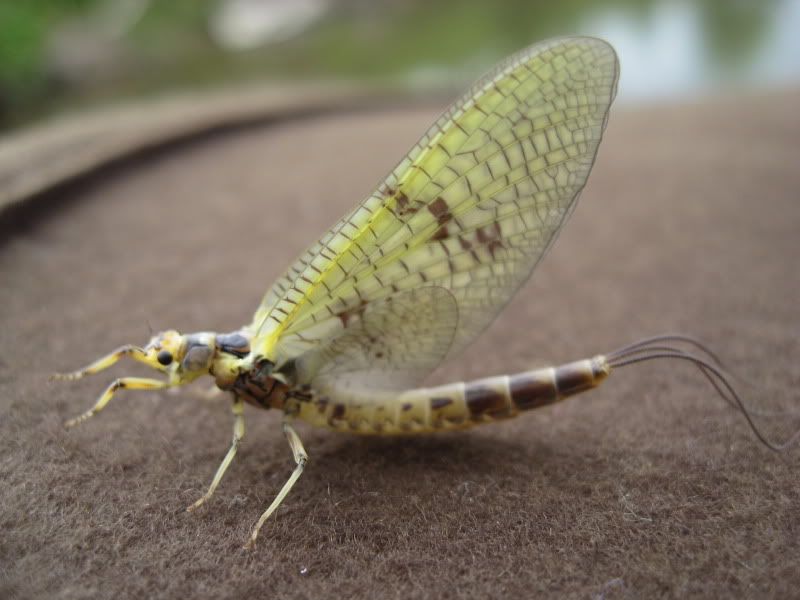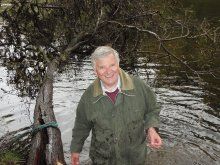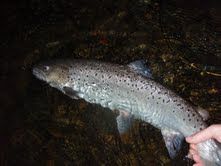
The initial consultation process about the Water Framework Directive was tortuous, tedious and a real drudge. I got the impression that without several degrees and an encyclopedic knowledge of the innumerable learned papers produced by goodness knows who, the whole process was, it seemed to me, designed to frustrate all but the experts.
However, last week I attended two catchment workshops: the River Conwy and the River Clwyd. Attendees included NRW staff of course, representatives of farmers, commercial forestry, local Council, Bangor University, National Park, National Trust and many more. The NRW made it quite clear that they were addressing each river catchment separately and identifying specific issues impacting on each. They also made it quite clear that financial constraints meant that they could not address many of the issues without support from other sectors. I went to the workshops cynical and wary: I think the EAW had lost a deal of credibility over the years, although staff in this area were trying to put that right. After the Conwy meeting we were asked to complete a “what did you think of that?” form, which I did, expressing gloom and despondency. The Clwyd workshop was two days later, by which time I had given some thought to the previous proceedings and had a change of heart. I think the NRW are being honest and as open as they can be and look forward to the follow on consultation when, I hope, the intention will be to set up joint efforts to address the issues identified.
I was also reminded of the good work being done by the River Trusts. The Clwyd, Conwy and Gwynedd Rivers Trust have carried out a number of substantial of environmental improvement schemes, mainly but not exclusively to tributaries, where in years gone by salmonids had spawned in great numbers.
The time has come for more partnership working, even at club level, where by a joint effort beneficial improvements can be made to in river habitat, but more importantly in the long neglected tributaries.
In view of the current concerns being expressed by many anglers and clubs a look at the latest Angling Trust news sheet will be a help. Click Angling Trust under Publications.
There is a potential threat to our fisheries here in Wales. Many of the conifer forests that blanket the hillsides which overlook our rivers, and through which many of the spawning tributaries run, are due to be clearfelled, having reached maturity. Once this clear felling takes place the ground beneath, which is exposed, may be covered by as much as three feet (nine hundred millimeters) of pine needles. This depth has taken 40 years to accumulate. With no forest to hold them in, there is a risk that these pine needles, come the next heavy rainfall, will essentially be swept down the hillsides and into the rivers and streams en mass. The result: a massive increase in the acidity of the water, with the potential to kill all invertebrates in the river. This could mean that we will have dead rivers, void of all food, so that most, if not all, immature fish will perish. We recommend that you monitor the acidity levels in your rivers, streams and tributaries, your local Rivers Trust will be able to help in this, and that in May you monitor your fly life carefully (your Rivers Trust will also help in organising this). Then report your findings to NRW. This will help the investigation into this potential threat
We will keep you posted
We wish you all a very happy new year in the hope that 2014 will be a happy and prosperous one, with many “tight lines”. Our wish is that there is:

an increased and growing awareness of the importance of environmental improvement works for the betterment of our fisheries and more importantly our fish and for those that join in the big plus of some healthy outdoor exercise! Try forming a local group with the aim of getting to know the tributaries where the fish spawn, make contact with the local landowner and the NRW officer responsible for the river and work together to make things better
We urge all of you who care about our fisheries to encourage fellow anglers to participate in the various campaigns that are on going and likely to be needed over the coming year. We need all remember that our politicians are in public service and that gives them the power to act in our best interests. Apathy is unforgivable!
It would be nice to see more activity on our forum?
Salmon Net Fishing Association of Scotland [SNFAS] to resume net fishing in the spring after a 14 year voluntary cessation. – Please sign the petition: click on this link and pass on the message to other anglers. It may make all the difference.
Click Here
For job description and further details job description below.
Job description
To read the Wye Salmon Association review of the 2013 season click the link below.
Review 2013 season
The two links below will open up .pdf’s of the two pages from the North Wales Daily Post which contained an article outlining the continuing efforts of Chris White of the Conwy Valley Fisheries and Conservation Association. Chris has been a tireless campaigner for our fisheries for many years now and is to be applauded for his dedication and unstinting efforts. Let us hope that his efforts may persuade the Welsh Government to provide funding sufficient to protect our fisheries. Nice one Chris!
 Chris White The Article
The following press release has been issued by Graeme Harris, which I am sure will be of great interest to those of us that participated in the scheme as well as all sea trout anglers. I sound fascinating.

As follows.
To Welsh Fisheries Interests. The EU-Funded Celtic Sea Trout Project is now in its final stage of completion. Following similar events for stakeholders in Scotland (Dumfries) and Ireland (Drogheda) this autumn, we will be holding a final ‘Project Closure’ meeting for our Welsh Stakeholders in North Wales on January 8th 2014 when each of the leaders on the 6 separate Work Tasks will provide a short presentation outlining their principal findings relevant to the future management of sea trout stocks and fisheries in the Welsh region. A formal invitation, event programme and venue location map are attached to this covering note and we hope that either you or your representative(s) will be able to attend. Please forward this information to anyone else who you think may be interested in this important, ground-breaking study. Places will be allocated on a first-come first-served basis. Further background to the Project may be obtained at www.celticseatrout.com , but please contact Graeme Harris on 01874 731175 or at fishkill@btinternet.com for further any further information about these arrangements.
Regards, Graeme Harris.
Programme
Invitation
Directions

Please record your support on the accesscymru web site by clicking on the link below which is highlighted in red. Sending your club logo to add to the list of supported would also be good. We must show a united front so your signing up to show support really does matter. Other interested parties that wish this to go ahead are well organised and putting up a good show: we have to do better. click here
Photo thanks to freedigitalphotos.net
A broad-based coalition has been launched today (15th November 2013) with a website at www.accesscymru.org to campaign for locally-managed access to the Welsh countryside and rivers to ensure that it is sustainable and does not impact on legitimate and economically-important activities such as farming and angling. The coalition is responding to an on-going consultation on access to the countryside by the Welsh Government, led by the Minister for Culture and Sport, John Griffiths AM, who refused to rule out the possibility of opening up access to all land and water without restrictions at a recent meeting with coalition members, which has incensed a wide range of people who make a living in the countryside.
A series of consultation events have been held with stakeholders at which landowners and angling bodies have expressed their concern about the impact on wildlife, livestock and property rights from the proposals. The coalition wants to see sensitive wildlife and fish spawning sites protected, members of the public kept safe from livestock, and to avoid conflict with legitimate users. They are very concerned about the potential legal liabilities and insurance costs that would be heaped onto rural businesses as a result of unfettered access to the countryside being imposed across the whole of Wales. Many livestock farmers, already under great economic pressure, have said that this would have a very damaging effect on the way that they farm, with concerns over dog controls and damage to crops. There are great fears that members of the public might be injured or killed by farm animals when straying off managed paths.
Angling clubs are extremely worried by proposals for universal access to water as they are already suffering the impacts of widespread illegal canoeing. Angling clubs and landowners have had great difficulties finalising voluntary access agreements because Canoe Wales has refused to allow its regional representatives to agree to any restrictions, insisting instead on access at all times and water heights.
A green paper consultation is expected before Christmas and the leaders of the organisations are holding a series of meetings with Assembly Members, Ministers and officials to make their views clear. The coalition of rural organisations has launched a call for funds to support the campaign, including the cost of legal advice on potential challenges to legislation. Details of where you can send your donations can be found at www.accesscymru.org where you can also sign up in support of the campaign.
Rachel Evans, Director of the Countryside Alliance in Wales said: “Wales has a vast network of footpaths and bridleways and large areas of National Park which are available to walkers, riders and mountain bikers. It is already difficult for farmers and landowners to manage their activities to keeppotentially dangerous livestock away from these paths. A free-for-all would create chaos in the countryside.”
Ben Underwood, Director of the Country Land and Business Association in Wales said: “We have put forward a range of proposals to improve access legislation to remove some of the bureaucratic red tape and to reach agreements more rapidly at a local level so that local people and visitors alike can explore the Welsh countryside safely, but without damaging the interests of thousands of rural businesses who make their living from the land, and are major employers. We would strongly resist any blanket proposals that did not take into account local diversity.
Mark Lloyd, Chief Executive of the Angling Trust & Fish Legal said: “On several rivers, such as the Wye, Usk, Dee, Conwy and Teifi, agreements have been drawn up to allow canoes and other boats access at certain times of the year to avoid conflict with anglers and/or spawning fish. These agreements have worked well in many places, but in others they have not progressed because Canoe Wales has resisted agreements which do not allow unfettered access for everyone at all times. The canoeing governing bodies have also created confusion in Wales and the rest of the UK by suggesting that there might be some uncertainty about the law regarding navigation, which there is not.”
Tony Rees, Chairman of Angling Cymru said: “Officials have shown an interest in replicating the right to roam arrangements in Scotland, but this is not a good comparison. There have been significant problems in areas close to major urban centres in Scotland and angling businesses on rivers such as the Tay have lost a huge amount of visiting anglers because of an influx of commercial rafting companies that make fishing impossible. Wales is in easy access of Liverpool, Manchester, the West Midlands conurbation and Bristol; unregulated access to rivers could impact very significantly on tens of thousands of people in Wales who are members of local angling clubs. Angling Cymru has always promoted voluntary access agreements as the preferred way forward and its members are committed to this end.”
George Barron, Chairman of the Welsh Salmon and Trout Angling Association said: “I feel that the new legislation being proposed by John Griffiths AM is basically the ‘Nationalisation’ of all Welsh waters and land. If unrestricted blanket access goes ahead, all farmers, landowners and most certainly angling clubs, may no longer have control or be able to manage effectively the assets presently under their control. Any new access legislation must be agreed locally by all the User Groups, they must be regulated and endorse similar codes of conduct as expected of the landowners and angling clubs. Given that enforcement by the NRW will be a major concern, particularly on the waterways, all User Groups should also share the cost of improved bailiffing and enforcement on a pro rata basis.”
NOTES:
- · Please direct all e-mails via the link on the SACC website
- · The Welsh version of the website will be available in the next ten days
- · This is a copy of the press release sent to all media
With best wishes and sent on behalf of SACC,
Rachel
Rachel Evans
Director for Wales
07825337978
|
Fish Legal takes its battle against sewage pollution to the High Court after Natural Resources Wales (NRW) let Dwr Cymru / Welsh Water (DCWW) “off-the-hook” for damage caused to Llyn Padarn; a precious glacial lake in North Wales, containing a unique sub-species of arctic char found nowhere else in the world.
In February 2012, Fish Legal formally notified NRW of damage to the lake under the Environmental Damage Regulations, triggering a 17 month investigation. The eventual report released in June this year did identify DCWW as responsible for causing environmental damage, but crucially, the regulator failed to require measures to stop the threat of future damage, from the regular discharge of untreated sewage into the lake.
Fish Legal believes the decisions taken by the newly-formed environmental regulator “Natural Resources Wales” to be legally flawed, and in an effort to save the fishery has applied to court for judicial review. NRW must now explain its decisions to a judge.
Acting on behalf of its member club the Seiont, Gwyrfai and Llyfni Angling Society, Fish Legal has campaigned for many years against damage caused by sewage to Llyn Padarn and its rare fish.
The once pure waters of this Site of Special Scientific Interest (or SSSI) have been contaminated for decades by sewage discharges from DCWW facilities, leading to a toxic algal bloom in 2009. A protected species of fish (an ice-age relic sub-species of arctic char) found only at this lake continues its decline towards extinction.
William Rundle, Head Solicitor at Fish Legal, said: “In our ongoing fight to save the char, we have used new laws implemented in 2009 to force regulatory action. Unfortunately, but perhaps unsurprisingly given the history of this case, the resulting investigation report has proved a major disappointment. A clear opportunity to safeguard the lake and protect the future of this unique fish has almost been lost. We believe the decisions taken are fundamentally wrong and so we have sought judicial review. We want a judge to quash these decisions and direct the regulator to reconsider its position lawfully.”
He further said:
“Environmental regulators must end the practice of dumping untreated sewage into lakes, rivers and coastal areas, and this could be a significant step towards achieving that vision at this important conservation site. This case will also help clarify how these regulations should be used to protect the environment elsewhere in the UK.”
Huw Hughes, experienced angler and Club Secretary, said:“Due to continuing sewage pollution of Lake Padarn, fishing in both lake and river Seiont continues to decline. Natural Resources Wales estimate that relatively few adult charr remain, an insufficient number to ensure a healthy breeding population. However, if strict regulatory action is adopted immediately there is still hope that this tragic situation can be reversed” |
Putting Poachers in their place – Launch of PROJECT TRESPASS
Project Trespass – a new initiative to provide a coordinated response to poaching will be launched on (1st October 2013) by the England and Wales Poaching Priority Delivery Group, which includes the National Wildlife Crime Unit (NWCU) in its membership.
Tackling poaching is one of the UK’s wildlife crime priorities. It blights the countryside and affects farmers, landowners and others living and working there. Poaching increases across England and Wales during late autumn following the harvest and as the hours of darkness increase.
44% of all wildlife crime reports from across the UK provided to the NWCU relate to ‘poaching intelligence’ including the poaching of deer, fish and game and hare coursing.
Nevin Hunter head of the NWCU said: “Poaching is a criminal activity – all poachers are trespassers and analysis by the NWCU over the past two years shows that given an opportunity poachers have diversified into thefts, burglaries, assaults and other rural crimes. Many police forces are developing rural crime strategies where the tackling of all wildlife crime and particularly poaching is a priority. Project Trespass will help in the effort to coordinate intelligence and responses to reports of crime.”
PROJECT TRESPASS aims to coordinate action across England and Wales through –
- Prevention – offering best advice to farmers, landowners, gamekeepers, shooting and land management organisations regarding measures to put in place to prevent poaching and disruption mechanisms.
- Intelligence – to allow the police to target offenders.
- Enforcement – with good intelligence the police can target poachers through the various rural and poaching based operations run throughout England and Wales.
- Reassurance – by working together and by publicising resulting actions such as activity, arrests, seizures and convictions.
Dilip Sarkar, Fisheries Enforcement Manager for the Angling Trust said: “Anglers reporting incidents to the police should refer to both Project TRESPASS and our Elementary Guide to Angling Law & Fisheries Enforcement which is available to all officers on the Police Online Knowledge Area. In the event of Angling Trust members not receiving an appropriate level of service from the police they should contact me with details; I will then notify Detective Inspector Nevin Hunter at the NWCU who can take up the matter with the force concerned.
This is all part of our strategy to educate police officers that poaching and fish theft are criminal offences and that offenders are often involved in wider patterns of offending – including firearms and drugs.”
|
A sample text widget
Etiam pulvinar consectetur dolor sed malesuada. Ut convallis
euismod dolor nec pretium. Nunc ut tristique massa.
Nam sodales mi vitae dolor ullamcorper et vulputate enim accumsan.
Morbi orci magna, tincidunt vitae molestie nec, molestie at mi. Nulla nulla lorem,
suscipit in posuere in, interdum non magna.
|
|




